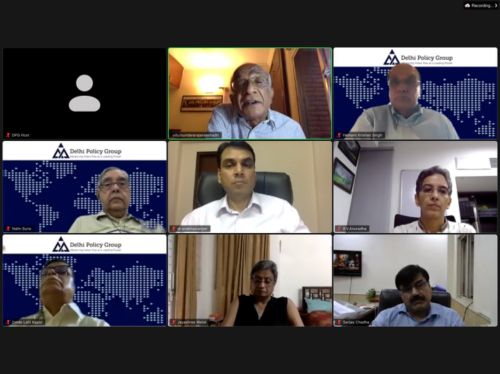DPG Web Roundtable on ‘Moving Trade Agreements Forward with Select Partners’
On September 7, the Delhi Policy Group (DPG) held a closed-door web Roundtable on ‘Moving Trade Agreements Forward with Select Partners’. The Roundtable was chaired by Amb. H.K. Singh, moderated by Amb. Dr. V.S. Seshadri and the keynote panelist was Mr. Sanjay Chadha, Additional Secretary, Ministry of Commerce and Industry. The panelists at the Roundtable included Prof. Arpita Mukherjee, Prof. Ashok Gulati, Prof. Rupa Chanda, Dr. Rajat Kathuria, Prof. Abhijit Das, Prof. Jayshree Watal, Prof. Prabhas Ranjan and Ms. R.V. Anuradha.
The growing trend towards the decoupling of trade, investment, technology and value chains has been accelerated by the COVID pandemic. In response, countries like India, Japan and Australia have expressed a desire to build alternative, trusted supply chains under a ‘Supply Chain Resilience Initiative’. The Government of India is moving ahead to build national economic resilience and security with its Aatmanirbharta program. At the same time, to relate the local with the global, it has shown revived interest towards forging trade agreements with a few trusted partners.
The roundtable brought to the fore a wide array of issues that will require attention in the context of such negotiations, which could be qualitatively different from earlier FTAs. The government will need to show agility in developing trade policies and aligning trade and industry behind them. In the agriculture sector for instance, the government could focus on increasing income rather than controlling prices. Investing in infrastructure and creating an enabling environment for stable agricultural exports can help our farmers play an active role in global markets. Innovative strategies in terms of subsidies for agriculture deserve consideration. Significant agricultural exports to West Asia, Central Asia and Africa can result if support is extended for their freight. A calibrated approach on agriculture imports can be designed to promote domestic agro-industries. Investments in agriculture R&D are important.
On goods trade, achieving real export market access would be essential beyond tariff reductions. Non-tariff regulatory measures need to addressed so that they do not turn into barriers. The link between FDI and trade policies needs factoring in for enabling growth of supply chains. Greater servicification of manufacturing also needs understanding and incorporation in policy.
The greater synergy that exists on trade in services with select partners provides more scope for strategising. The old paradigm of trade negotiations focused on IT related services. Sectors such as education, healthcare, transport and logistics can also animate India’s services trade policy. There is also a need for policymakers to look beyond Mode 4 (temporary movement of people) for supply of services and explore Mode 3 (commercial presence).
Regulations on movement of data and digital trade have gained prominence and will figure in the negotiations. India’s own national framework is under evolution, which needs factoring in. Understanding comparative advantage will also be key in taking a balanced approach. Given the growth of Artificial Intelligence (AI) and other technologies, the approach pertaining to data utilisation has substantial relevance for trade and investment. Equally, there is a need for effective policies and creating adequate space for national champions in the digital domain.
India has to be cognisant of the likely demand for a higher level of protection of Intellectual Property Rights (IPRs). While exercising caution, there is scope to constructively negotiate in this area. Concerns like affordable access to medicines are important and legitimate and will need to be adequately provided for. Considering the gaps that exist between certain FTA templates and our own laws, expert groups, bound by confidentiality agreements, may be needed to suggest ways forward.
FDI into the country and growth of supply chains will be influenced by legal frameworks such as investment treaties. Currently, India is seen as having two different approaches – one for bilateral investment agreements and the other for FTAs. Greater clarity will be needed to extend a fair level of protection to all investors.
Trade agreements are not the best mechanisms for regulating labour and environment matters. But this emerging reality needs to be managed through a facilitative rather than a sanctions-based approach, for which templates exist.
As India moves forward to conclude these trade agreements, it is important for the government to take a balanced approach in line with India’s development needs.




